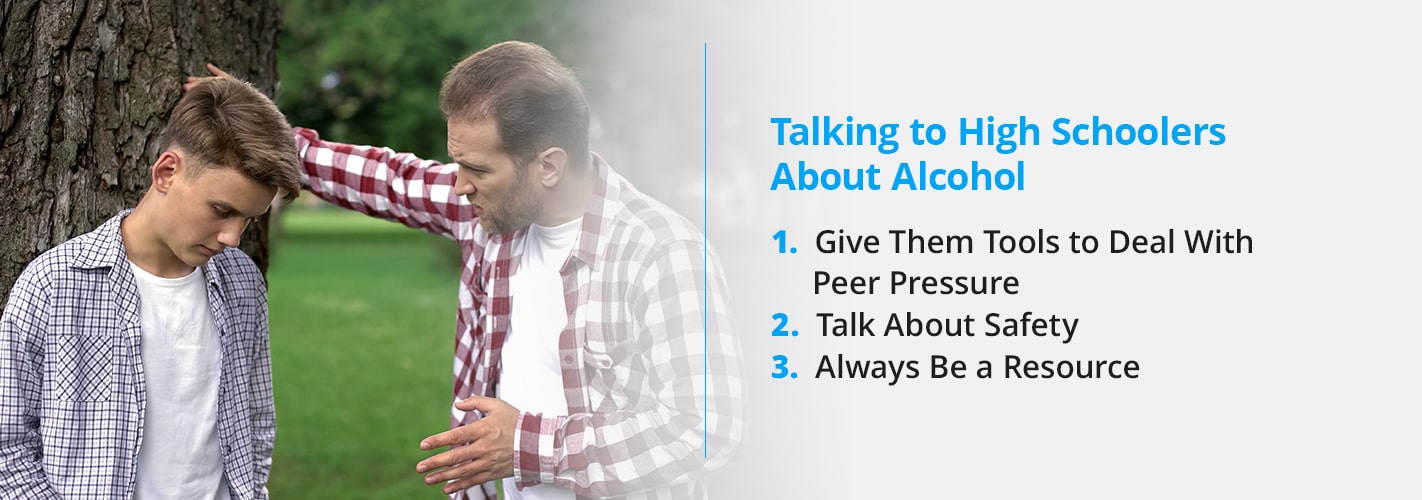While our society often normalizes high school drinking, it can lead to physical, emotional and behavioral problems along with addiction. Teen drinking may feel like a sensitive subject, but it’s crucial to talk about it before it’s too late. Middle schoolers, high schoolers and college students need to be aware of drinking’s potential risks and how to navigate the world of parties and peer pressure. When it’s time to talk to your teenager about alcohol, you may feel overwhelmed or at a loss for words. Addressing teen drinking with your child can seem like an insurmountable challenge. You can use these tips for talking about teen drinking to make the conversation more straightforward and productive.
Talking to Middle Schoolers About Alcohol
You may think middle school is too young to bring up the topic of alcohol use, but according to the National Institutes of Health, it’s the best time to start the conversation. Your middle schooler may already have access to alcohol — 32% of eighth-graders report drinking in the past year, and 64% say alcohol is easy for them to get. Here are some tips on talking about alcohol with your middle schooler.
Be a Good Listener
If you want your child to be open and honest with you, you’ll need to establish yourself as a good listener. Encourage your child to talk to you about their interests. Practice active listening without interrupting. Ask open-ended questions about how your child feels. Validate their thoughts and ideas. Having healthy, thoughtful conversations with your child will pave the way for more serious talks.
Always Show Respect and Patience
Consistently demonstrate respect and patience with your child. When your child says something you find concerning or frustrating, regulate your emotions and respond constructively. Even if you have insights you feel would be valuable, try not to lecture your child or prove that you’re “right.” When your child feels respected and safe with you, they’ll be more likely to engage and keep the conversation going. If your child has questions about alcohol, provide honest, helpful answers.
Be Mindful About Timing
Be sure to pick a thoughtful time to have a conversation about alcohol. For instance, if your child just failed a quiz or lost a friend at school, it may not be the best time to have the conversation. Your child’s negative feelings will loom over the discussion. Instead, choose a moment when both of you feel relaxed and comfortable.
Explain the Dangers
Kids are unlikely to follow the rules if your only justification is “because I said so.” Instead of demanding your child not drink with no reasoning, explain why drinking can be dangerous. Mention that underage drinking:
- Is against the law.
- Can lead to risky behaviors.
- Often results in problems at school.
- Can cause alcohol poisoning.
- Can lead to addiction.
- Might cause brain development issues.
Talk about your child’s short and long-term goals and aspirations. Discuss how drinking might affect their ability to achieve their goals. Encourage your child to develop healthy emotional outlets and hobbies.
Talking to High Schoolers About Alcohol
In high school, drinking becomes even more prevalent. According to data from the Centers for Disease Control, about 30% of high school students report drinking alcohol in the past month. Your child will likely have some exposure to alcohol throughout their years in high school. When you talk to your high schooler about drinking, mention social pressure and safety.
Give Them Tools to Deal With Peer Pressure
Sometimes, teens who are not interested in drinking will face peer pressure to do so. It’s essential to help your child navigate these situations. Brainstorm ways to respond to their friends. Offer yourself as a resource. Tell your child they can always call you if they need to escape an unsafe or uncomfortable situation, and promise not to punish or scold them if they do.
Talk About Safety
Talk to your teenager about safe, responsible drinking. Explain that alcohol’s effects take time to set in and that alcohol can stay in your system for several hours. While it would be ideal for your teen to avoid drinking altogether, it’s vital to talk about safe drinking habits and how to prevent alcohol poisoning. Above all else, ensure your teen knows to never get behind the wheel of a car after drinking and to ask a sober friend to drive them home instead.
Always Be a Resource
Make sure your child feels comfortable coming to you when they need help. That includes not threatening severe punishment if you find out your child has been drinking. Your child’s safety is paramount, and they should always feel they can rely on you to keep them safe.
Talking About Underage Drinking Before College
College is an environment where young adults have more freedom and independence than ever before. Still, drinking under 21 is illegal and can have severe, long-term consequences. It’s critical to keep talking about alcohol use before your child goes off to college.
Continue to Discuss the Risks
Help your child understand the risks involved with drinking — they could end up kicked out of school, with a criminal record or in a hospital. Try not to use scare tactics — calmly state the facts and encourage your child to consider the dangers. Discuss the statistics, including that one in four college students reports academic difficulties due to drinking.
Check in Often
College can be stressful, and many people view alcohol as an outlet for stress relief. Periodically check in with your child to ask how they’re doing. If they admit they’re struggling, provide help in any way you can. Offer them support through challenging circumstances like dropping classes or changing majors.
Continue to Be a Resource
Make sure your college-aged child understands you will always be a resource for them when they need help. They should feel safe reaching out to you, regardless of the situation. Again, their safety is the highest priority.
Contact Merrimack Valley Psychological Associates for Professional Guidance
It may seem challenging to address the topic of alcohol with your teenager. Regardless, it’s vital to have a productive, thoughtful conversation before alcohol becomes an issue in your teen’s life. Help your child understand the potential risks and dangers of drinking. Always maintain a helpful, patient and respectful tone. Make sure your teen feels safe coming to you for help. You might need professional guidance during a tough conversation like this. If you do, reach out to Merrimack Valley Psychological Associates. We offer compassionate mental health services using clinically tested and statistically reliable treatments. To learn more, contact us at Merrimack Valley Psychological Associates today.
Reviewed By
Dr. David Rainen, PsyD.
I am a licensed clinical psychologist with an extensive background treating a variety of different ages, situations, emotional and mental health disorders in individuals and their families. As part of my 10 year professional and training career in psychology, I have developed and refined my skills and approaches through my work in a variety of diverse settings including: hospitals, community outpatient facilities, college counseling centers, secure and unsecure inpatient/residential treatment programs, and therapeutic day schools.




